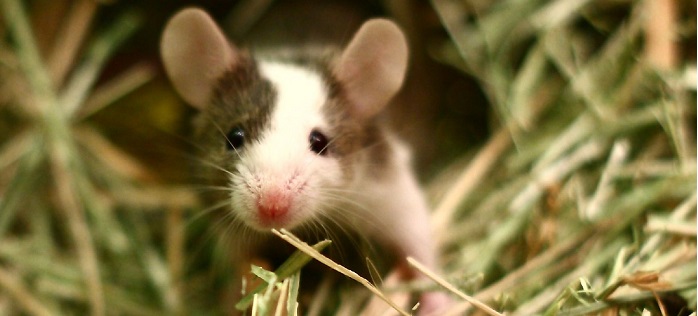
Mice <mus musculus> are popular pets nowadays. They first originated in Asia and the history of mice as pets dates back to a mention in the Erya (oldest Chinese dictionary that still exists) in the 1100 B.C version. In the 17th century, Japanese mice gained popularity as ‘fancy mice’ in Europe. The national mouse club was founded in England by Walter Maxey in 1895. This was the begining of the worldwide phenomenon of Mouse shows, clubs, exhibitions and even mice as pets.
Mice are inexpensive small pets that are curious, intelligent and very entertaining. They groom and clean themselves frequently, enjoy regular handling (TIP: When you are picking the mice, make sure you grab the base of the tail, instead of the tip and put them in your hand) and very rarely bite, which makes them excellent pets. In the wild they are nocturnal however; mice as pets can be active day and night. There are over 40 varieties of mice that are kept as pets. The most popular one is the ordinary house mice. Wild mice have the life span of 1-2 years but mice as pets can live up to 3 years.
What to look for in a mice and where to get it?
Pet shops and well known breeders are the best place to get pet mice. Healthy mice are curious, active and have shiny clean coats. If you see any discharge in their eyes, nose and the mouth, they might be diseased. Red spots and sores on the skin are signs of skin diseases and you don’t want diseased mice as pets. If the place where they are housed is dirty and stinky, you don’t want to buy a mouse from there. Another way to make sure that the mice are healthy is by checking their stool as those that excrete hard pellets are healthy.
Good breeders or pet stores separate the males and the females at an early age to avoid unwanted litters. Females are the best pets as they do not stink as bad as the males do. Lonely mice get depressed and may start getting aggressive, so think about getting two of them instead of just one. Two female mice are perfect as they socialize better. Male and a female should be avoided if you are not ready for lots of mice. It is not good to keep 2 males as they will always fight but if they are from the same litter then, you might be able to keep them if the cage is large enough to have their own domain (space). Mice when separated from their mother before 6-8 weeks may suffer from anxiety, so make sure that they are at least 8 weeks old before you keep them as pets.
Housing:
Pet mice can be kept in a cage, wooden box or an aquarium. Make sure you cover it up with a lid so that they will not get out and cats or other predators cannot get to them. Wherever you decide to keep your mouse, make sure there is plenty of ventilation for the air flow. For the mice to be warm and comfy, the bottom of the cage should have hay, sawdust or newspapers. They love to play with toilet paper rolls, paper cups and tin cans. The mouse wheel and ropes are also very enjoyable toys. To keep healthy mice as pets, make sure to clean everything in the cage at least twice a week. Bedding should also be changed at least twice a week to ensure that there is no ammonia build up.
Feeding and Caring:
Mice as pets do not require expensive food and care. They are omnivores so will eat almost anything. However, balanced diet is a must to have healthy mice. Nutritious pellets from your local pet stores, cooked rice, oats, bread and fresh vegetables and fruits will give your pet mice all the nutrition they need. Some household foods like avocado, mustard seeds, coffee beans and chocolates should not be fed as they are toxic to mice. Seeds like sunflower seeds and nuts should only be given as treats since they contain high amount of oil. As their teeth continue to grow throughout their life, a bone or a block of hardwood must be provided so that they can gnaw on it and maintain the proper length of the teeth. Always make sure they have plenty of fresh water and if the mouse is nursing, you can give them milk as well.
Breeding:
Wild mice have the life span of about 2 years however, mice as pets can live up to 3 years. They mature in about 8 weeks and are ready to breed. In a litter, females can have up to 12 babies and after 3 weeks they are ready to have another litter. The babies are pink and blind when they are born. After a week, fur will start growing on them and after 10 days, they will open their eyes. Do not hold the new born for too long. After they open their eyes, however, it is wise to hold them frequently as mice when held from an early age become tamed.







Thank you very much! This was a very helpful site!